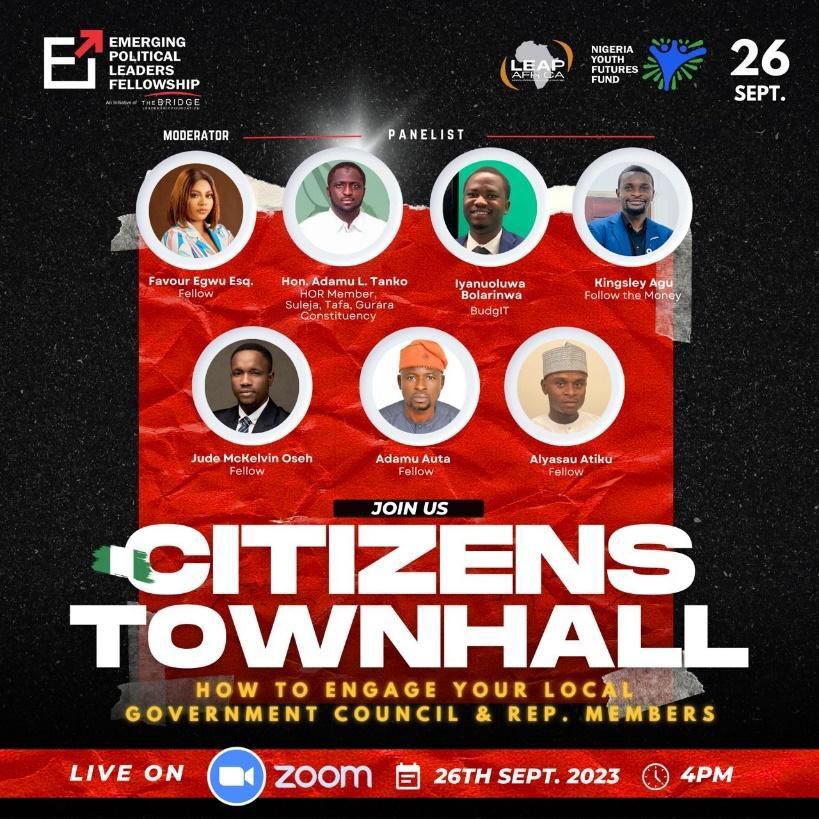A Civic Engagement Activity by Jude Oseh, Adamu Auta, Favour Egwu, and Alyasau Atiku 2023 EPLF Cohort Fellows
In line with the Fellowship’s steadfast commitment to Civic Engagement, and with generous support from LEAP Africa and the Nigeria Youth Futures Fund, the 2023 EPLF Fellows initiated a significant Civic Engagement Project, hosting a ‘Citizens Town Hall’ focused on “How to Engage your Local Government Councils and Representative Members.” The primary focus of the meeting was to underscore the critical importance of fostering effective communication and engagement between citizens and their local government representatives in Nigeria. The speakers delved into the multifaceted challenges faced by citizens when interacting with local government leaders, including issues such as the infringement upon the autonomy of local government functions, the absence of transparency and accountability, and the emergence of citizen apathy. In response, they emphasized the pivotal role of civic education and community engagement in overcoming these hurdles and advancing transparency and accountability.
The objectives of this activity, as listed below, were to:
- To clarify the pivotal roles and responsibilities of local government councils and representatives within our society.
- To illuminate the processes involved in initiating and financing constituency projects, and to empower citizens with knowledge on tracking their execution.
- To explore the prospective advantages and results of active citizen involvement with local governments and representatives.
- To shed light on the legal and ethical aspects that citizens should be mindful of when engaging with local government councils.
Key Outcomes
The meeting, hosted by Jude Oseh, an Emerging Political Leaders Fellow, featured distinguished speakers renowned for their expertise in good governance and civic engagement. Notable speakers included Hon. Adamu L Tanko, a House of Representatives member representing the Suleja, Tafa, Gurara constituency, Iyanoluwa Bolarinwa from Budgit, and Kingsley Agu representing Follow the Money.
The meeting also tackled strategies for channelling projects into the budgetary process, featuring discussions on the annual action plan, the role of community governance groups, advocacy to relevant agencies and representatives, as well as dialogues with executive and government representatives. The speakers underscored the necessity for community members to unite, assess project prioritization based on available resources, and advocate for their inclusion in the budget. Furthermore, the meeting delved into the intricacies of the joint account system and the challenges surrounding access to allocations for local government councils to facilitate project implementation. Hon. Adamu Tanko elucidated how state governments have gained significant control over local government councils due to constitutional amendments, leading to a reduction in autonomy and capacity for project execution. The discussion also revolved around the significance of constituency engagement and the funding and execution of constituency projects. Hon. Adamu Tanko elucidated that Representatives are entitled to a specific level of funding through the budgetary process, with constituency projects serving as a means for legislators to contribute to development efforts. The conversation underscored the importance of Representatives engaging with their constituents and highlighted the necessity for innovative solutions within the political system to address the fundamental needs of the people.
Finally, the meeting equipped attendees with various tools and strategies to stay well-informed about local government projects. These resources included websites like budgit.org and followthemoney.org, which provide comprehensive data on budget allocations, project implementation progress, and infrastructure requirements.
Recommendations
Some recommendations the speakers explored during the discussions are as follows:
- Citizens will actively participate in the budgetary process by nominating projects and monitoring their implementation, and by advocating for the inclusion of community needs in state and national budgets.
- Citizens will actively participate in town hall meetings and other community engagements to voice their concerns and needs to local government leaders.
- Citizens will hold local government leaders accountable by asking questions, demanding transparency and accountability, and reporting any misappropriation of funds or negligence.
- Citizens will educate themselves and their communities about the roles and responsibilities of local government leaders and the importance of active citizen engagement in governance.
- Citizens will utilize tools such as the Follow the Money platform, Joining the BudgIT platform, and govspend.ng to stay informed about local government projects and engage with their representatives.
Next Steps
Looking ahead, as EPLF Fellows, we intend to adopt the Citizens Townhall as a civic engagement strategy to engage citizens in amplifying their concerns, this approach will be done virtually to ensure citizen plights are heard and draft recommendations are sent to the necessary authorities responsible for taking actions like their Local Government Chairman, House of Assembly member, House of Representative member, Senator and the Governor.

